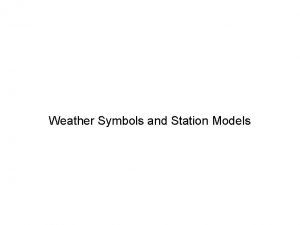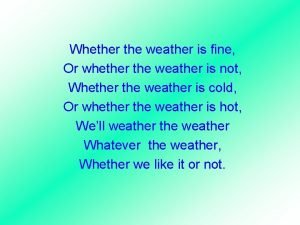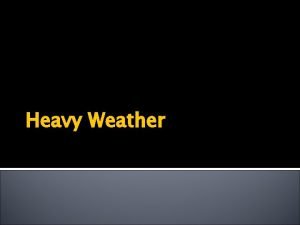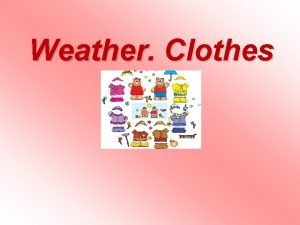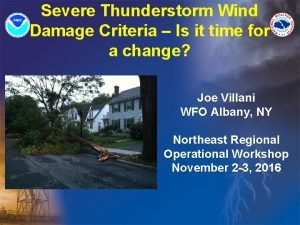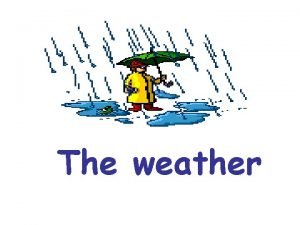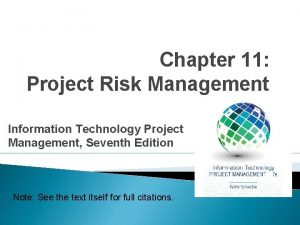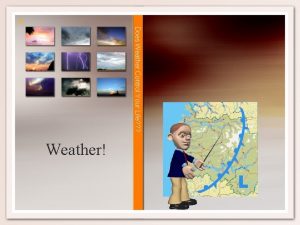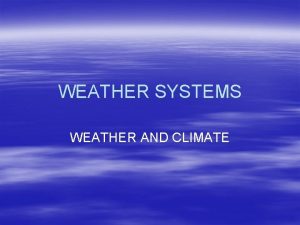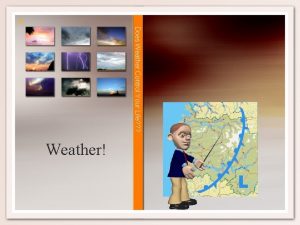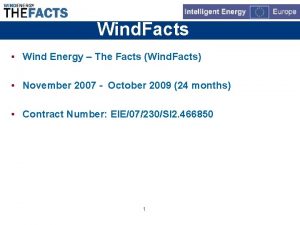Top 11 facts on UK weather 11 Weather












- Slides: 12

Top 11 facts on …. UK weather

11. Weather Vs Climate Weather = • day-to-day conditions of the atmosphere. • Changes frequently. • Refers to temperature, precipitation (type & amount), cloud cover & wind strength Climate = average weather over a period of time (min 30 years)

10. What affects the UK’s weather? Latitude means how far a place is from the equator. At places near the equator the sun is more focused on a small space so temperatures are higher At places further from the equator the sun is spread over a larger space (because the earth curves) so temperatures are lower. Distance from the sea: In summer the sea is colder than the land, so when the wind blows over the sea onto the land it keeps the area cool. In winter the sea is hotter than the land, so sea breezes help to warm the coast. Ocean currents: Some oceans have warm water currents near the surface which will make the wind warmer as it blows over the ocean e. g. the North Atlantic drift Earth’s tilt: As the earth moves around the sun the angle it tilts at changes In summer the earth is tilted towards the sun and so temperatures are higher In winter the earth tilts away from the sun and we get less heat The prevailing wind direction will change the weather. In the UK the wind usually comes from the southwest which means it travels over the ocean and so there is rain Altitude means the height above sea level. The temperature falls by 1 OC for each 100 meters you go up. Places which are higher up hills or mountains will have lower temperatures.

9. How do air masses work? Remember: The first part of the name (polar, arctic, tropical) tells you where the air mass is from and gives an idea of the temperature The second part of the name (maritime, continental) tells you what the air mass travelled across and gives an idea of how much moisture the air mass will bring

8. Air masses & extreme weather • Tropical maritime: Strong winds 2014 • Feb 2014, winter storms from Atlantic, large waves breached defences in Cornwall, Devon & Dorset, SW mainline railway damaged at Dawlish, Devon, roofs damaged in Porthmadog & 1 killed on 13 th Feb. • Tropical continental: Heatwave 2003 • Most extreme heatwave for over 500 years, over 2000 died across Europe, wildfires broke out, rivers & reservoirs depleted, farm animals died & crops failed so food prices rose. • Arctic Maritime: Heavy snow 2009 -10 • Ice & snow bought down power lines affecting 25, 000 homes, transport network disrupted, several died in accidents, farm animals (esp. sheep in highlands) affected. • NB/ could also refer to ‘Beast from the East’ 2018

7. What’s our case study? Somerset Levels: 2014 Where? • SW England • Cover 650 km in north & central Somerset • Between Quantock & Mendip hills • Much is below sea level. Max height is 8 m asl Uniqueness? • Drained historically for agriculture and residential use • 1000’s of years ago was covered by sea, now mainly rivers & wetlands • Roman times = build sea defences • 17 th century = Dutch engineers drained area & dug channels to allow farming

6. What caused it? Causes: Physical • Prolonged rain, hurricane winds & tidal surges • Jet stream pushed low-pressure storms across Atlantic • 12 major storms between mid-Dec 2013 and mid-Feb 2014 Causes: Human • River not dredged for 20 years (was every 5 years at £ 4 million) & farmers warnings ignored by Government • Building on floodplain

5. How bad was it? • • Worst storms for 20 years Wettest January since records started in 1910 350 mm of rain in Jan & Feb (100 mm above average) Worst flood recorded; 65 million m 3 of water covered 65 km 2 Effects • 600 homes affected • Roads inaccessible • 6, 900 Ha of farmland under water for a month • Somerset economy lost £ 82 -147 million • Repairs cost £ 10 million

4. How did they fix it? Responses: short term • EA installed 62 pumps to remove 1. 5 million tonnes of water • Royal Marines used to rescue/help isolated people • Police increased patrols to support people Responses: long term • 50 defences need repairing • Options to remove silt/weeds from rivers, reduce run-off from housing developments and pay farmers to store floodwater • March 2014 Government released a 20 year action plan; increase dredging, repair flood banks, raise road into Muchelney, pumps are permanent, add a tidal barrier

3. Bonus ecosystems slide! How do they link to weather?

2. Weather skills

1. Synoptic links Topic links to: Paper 1 – rivers & flooding (theme 1) Paper 1 – rest of theme 3 Paper 2 – Ecosystems (theme 1) Paper 2 – extreme weather (theme 3) You may find it easier to revise these ideas together?
 Rok napoleonic code
Rok napoleonic code Multiplication facts and division facts
Multiplication facts and division facts Weather station model examples
Weather station model examples Whether the weather be fine
Whether the weather be fine Poem whether the weather
Poem whether the weather Heavy weather by weather report
Heavy weather by weather report What's the weather poem
What's the weather poem Capital weather gang weather wall
Capital weather gang weather wall Cold cool
Cold cool Top ten risk item tracking
Top ten risk item tracking Biotronic top liquid
Biotronic top liquid Top 10 ambulatory ehr vendors
Top 10 ambulatory ehr vendors Brain diencephalon
Brain diencephalon


